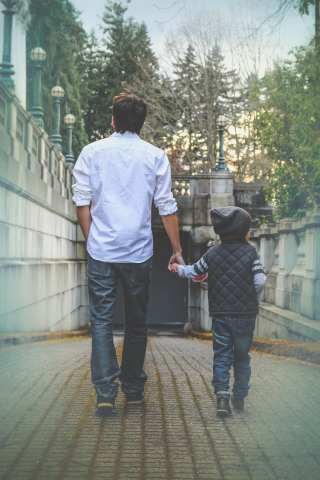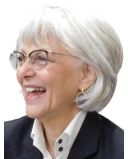Relationships
Applauding All the Fathers in a Singular Life
Personal Perspective: Appreciating those who helped birth all parts of ourselves
Posted May 31, 2023 Reviewed by Davia Sills
Key points
- Everyone has a birth father, the person who biologically contributed half of their genes.
- Some also have an adoptive or step-father, a person who raised them through childhood and adolescence.
- It's important for people to appreciate those who brought essential parts into being or helped them grow.

Birthing and parenting processes have become complex in recent years. (See Spar reference below.) Many options have replaced the original choice between mating or adoption. For some people, the concept of “father” has become as nuanced as that of gender.
When I taught the undergraduate course “Topics in the Psychology of Gender” at Yale during the 1980s, our notions of sex and gender and their influence on our psychological well-being had already begun to evolve. At a research level, in 1974, Sandra Bem created a measure of “psychological androgyny” and thus invited formal investigation. On a more anecdotal level, Lois Gould had published “X: A Fabulous Child’s Story” in MS Magazine in 1972, and the charming piece had been reproduced in the form of a picture book by Daughter’s Publishing. Most formal psychological research on parenting assumed that mothers were women and fathers were men. Notable examples were the longitudinal studies of parenting done by Sears, Maccoby and Levin and Jeanne and Jack Block.
Today the story is far different: A child can have one or two mothers (or more) or one or two fathers (or more) or a parent with no label at all. Understanding of “Family” has been radically revised. I can paraphrase one recent definition of "family" by the American Red Cross as people living together in the same household with the intent to continue living together.
Definitions of “good” parenting remain, albeit with varying weights. To offer the warmth, consistency, and reflection that foster “secure” attachment with the benefit of belief in one’s own lovability. To nourish the child physically, psychologically, and culturally, so that it can grow. To protect the child from dangers that come from their own immaturity; from others in their closest circle; from their surrounding environment like neighborhood, school, congregation; or from the larger physical, social, political, and economic worlds in which we live, as suggested by Bronfenbrenner’s ecological theory of child development.

How can and does a parent, regardless of gender definition, shield or expose a child to those worlds at what age and with what resources? How does the immediate family connect to a broader community that can provide an expanded sense of identity, whether through mirroring others or pointing out differences from them?
In thinking about my own experiences of birthing my daughter and adopting my son, I remain convinced that love transcends genetic connection, that we are in one another’s lives to learn from each other, and that one of life’s greatest joys can be to bear witness to another person’s development: to broaden their sense of possibilities; to help them appreciate their innate gifts and emotional reactions; and to walk alongside them through their challenges and triumphs, disappointments and hopes, dangers and opportunities.
My parents divorced when I was 3. I grew up in an era and at a location where a single-parent family was extremely rare. Indeed, I did not meet another “child of divorce” until I was in high school, making me an exotic and often shunned minority. To render this experience even more confusing, the breakup was hostile, and the differences in my parents’ post-divorce worlds were dramatic. Although I continued living in the same city among the same extended population for my first 16 years, I was part of one world when with my mom and another on Wednesday evenings or Saturdays when I was with my dad. Nonetheless, I had the same needs as any child—for love, acceptance, support, protection, definitions, and interpretation of rules, beliefs about the larger world and my potential place in it.
On Father’s Day, I have infinite gratitude for the many men and women who have helped raise me across the decades so that I could become the adult I wanted to be. I send thanks to:
My father, who showed me consistency, appearing each week as expected, except when I was quarantined with scarlet fever or when he was out of town. He introduced me to a larger world, one with movies, museums, zoos, concerts, and ball games. He showed me the annual traveling circus, performances of The Nutcracker, and the delights of playing games, culminating with our contract bridge partnership when I became a teenager. With him, I shared the love of discovery, of learning, and the deep joy of allowing beauty to nourish psyche and soul.
To my journalism teacher who let me play a role in our high school newspaper. He gave me the support to venture out into the larger world, the courage to explore multiple perspectives, and the tools to communicate discoveries to others who might find them interesting or useful.
To my first college advisor, who invited me and my friend to join his family when our distance from our respective homes made travel for brief holidays unfeasible. Both he and the father of that same friend taught me new ways to see a family working together for the support and encouragement of its members.
To my first husband who gave our children skills that I couldn’t: how to ride a bicycle, throw a ball, or make up silly songs that brought us all laughter.
To my second husband, who brought us delights in exploring or sharing an adventure, and whose sudden and untimely death taught us all how to grieve. We learned that mourning is an essential part of the gift of being able to love. His legacy is one of tenacity and courage.
To my mentors, both men and women, who helped me develop skills useful in a professional context and to believe that my natural inclination, being “a romantic with a scientist’s head,” could find applications in clinical, research, and academic work that brought excitement and meaning.
As Fathers Day approaches, may we all pass along the best that has been given to us by those fathers, of whatever gender, who have helped us live, learn, adapt, and become.
Copyright 2023 Roni Beth Tower
References
Spar, Debora L. (2020). Work, Mate, Marry, Love: How Machines Shape Our Human Destiny. Farrar, Straus and Giroux.




